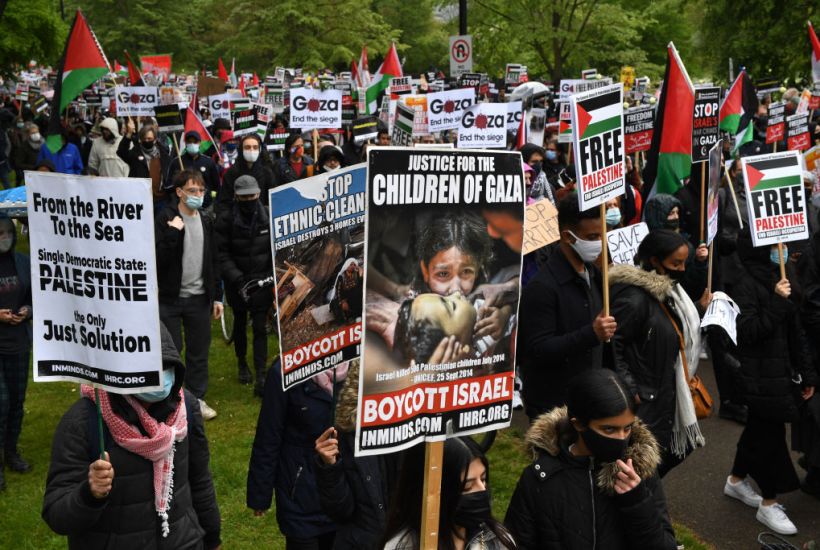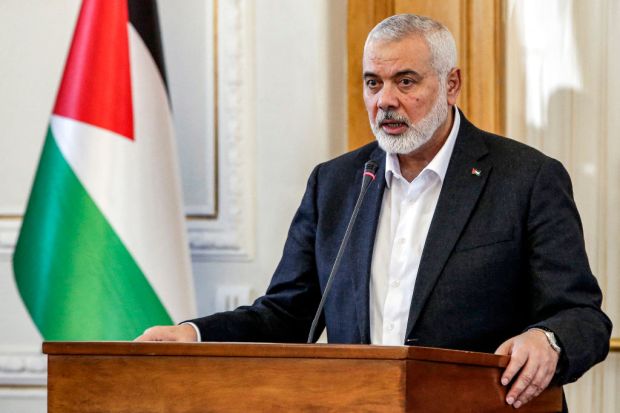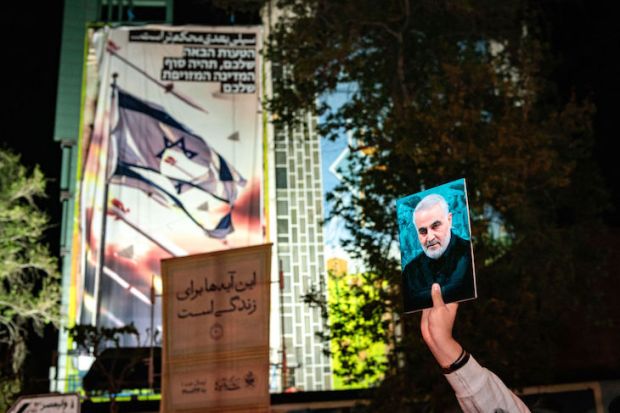As the dust settles over Gaza, and Israel’s Iron Dome sensors cool, minds inevitably turn to the lessons that can be learned from the 11-day conflict that cost hundreds of lives.
Foreign Secretary Dominic Raab, the American secretary of state Antony Blinken, and other international dignitaries have visited the region and offered their carefully calibrated support for ‘both sides’ delivering high-handed lectures on the ethics of asymmetric warfare in densely populated urban sprawl.
Sadly, however, the British government has become part of the problem. It may have deep military and security ties to the Jewish state, but there lurks an elephant in the room. London itself has been allowed to become one of the world’s most important Hamas hubs.
For years, Whitehall has looked the other way while NGOs allegedly linked to Hamas raise millions of pounds a year, which (according to Israeli intelligence) is funnelled into the terror group’s coffers. In other words, these are British pounds raining down on the heads of Israeli civilians in the form of lethal rockets. And nothing is being done about it.
This week, the Board of Deputies – British Jewry’s main representative body – held an emergency meeting with the Prime Minister, at which it called for Hamas’ political wing to be banned in Britain. At present only the military wing of Hamas is proscribed by the UK government. Boris Johnson offered warm words but nothing concrete.
In an exclusive interview this week with the Culture Secretary Oliver Dowden, the Jewish Chronicleasked him the same question. Dowden responded by passing the buck to the Home Office (though he pointed out that he had pressed for Hezbollah to be proscribed in its entirety when he was a backbencher).
For all these good intentions, more urgency is required. Given the recent hostilities, Britain cannot continue to defend its Janus-faced stance on Hamas, one of the world’s most insidious and brutal Islamist terror groups.
Let’s take a closer look at how it works. Israel has designated a number of UK-based NGOs as having affiliations with Hamas. These are not small organisations. Between them, they raise many millions of pounds a year, and according to Israeli security sources, some of this makes its way either directly or indirectly to Gaza.
Charitable donations do not go straight towards building terror tunnels, rocket factories and arsenals in the Strip, analysts say. That is largely funded by Iran. Instead, British funds are allegedly used to prop up Hamas’ welfare, or ‘Dawa’ activities: building schools, funding universities, paying salaries to the families of ‘martyrs’ and so on. From the point of view of Whitehall, you can see the argument: like it or loathe it, Hamas is in charge of Gaza. It needs money to care for its civilians, who are generally impoverished and suffering. Sure, it’s an apocalyptic jihadi terror organisation. But what’s a policymaker to do?
There are two main problems with this. Firstly, any money raised removes financial pressures from the group, allowing it to concentrate on building its terror infrastructure without troublesome money worries. The ‘Metro’ system of tunnels alone, which have been bored under civilian areas in Gaza since 2014 and which are used to train terrorists and mount operations targeting civilians, cost a million dollars for every kilometre built. If Hamas was forced to use Iranian money to pay for its rudimentary public services as well, its terrorist capabilities would be compromised. Fewer tunnels. Fewer rockets. Fewer deaths.
Secondly, Hamas is not the sole provider of public services in Gaza. Humanitarian agencies like USAID are scrupulous in their distribution of funds, ensuring that it goes to bodies outside of Hamas that do not support the terror group. This removes the de facto funding of terror rockets.
It is true that as ruler of the Strip, Hamas has a degree of influence over all humanitarian activity there. But the projects it carries out under its own steam are fundamentally pegged to its jihadi agenda, seeking to create goodwill and harvest recruits. The schools it builds are vehicles for indoctrinating the next generation of jihadis. The payments to the families of ‘martyrs’ are designed to entice new terrorist killers. And its other ‘Dawa’ services are a way of providing jobs to cronies, encouraging people to adopt Hamas’ ideology.
Take the Islamic University of Gaza. Often accused of being a Hamas stronghold, it is arguably both a functioning academy and a quasi-military installation. Many employees are Hamas sympathisers, and the university is used to recruit Gaza’s bright minds into the ranks of the terror group.
Intelligence sources suggest that the research and development that takes place in the laboratories and classrooms of the university is used for military purposes. That is, to kill innocent men, women and children. This institution is funded largely by Qatari money – as well as funds that were raised in Britain.
The dividing line between civilians and combatants simply does not exist in the world of Hamas, for both its enemies and its own domestic population. Security sources now allege that it was Yahya Sinwar, the group’s political leader in Gaza, who initiated the latest round of violence. When Ramallah cancelled the elections, he ordered a military offensive in an attempt to position Hamas as the natural leader of Palestinians. For Hamas, the military and the political are two sides of the same coin.
Because of this, not only do the two wings share the same ideology and resources, they even share the same personnel. As a senior Israeli security official who focuses on Hamas foreign funding told me:
‘The distinction between the military and civilian arms is – to be very polite – artificial, and has no place in the fight against modern terrorism. We saw in this latest conflict that the political arm dictates the use of force. The so-called civilian arm takes care of providing significant funding to the military arm, and members of Hamas’ military arm play a significant role in other arms.’
It is important to view all this in the context of the bigger picture. This is not a distant problem, confined to a small triangle of land in the Middle East. Jeremy Corbyn and his fellow travellers may call Hamas ‘friends’, but terrorist murderers over there want to carry out terrorist murders over here. Corbyn famously said: ‘The idea that an organisation that is dedicated towards the good of the Palestinian people and bringing about peace and social justice and political justice should be labelled as a terrorist organisation is a big, big historical mistake.’ About this and many other things, Jeremy Corbyn was, shall we say, incorrect.
The difference between Hamas and Isis does not lie in their intentions and theology so much as their tactics. Isis carries out staged beheadings; Hamas ties people to the back of motorbikes and drags them through the streets. Both lust after a vision of a caliphate. But while Isis goes blasting through the front door, trampling international law and conquering territory, Hamas straps on its suicide belt and rings on the doorbell of democracy. That is the way of the Muslim Brotherhood, Hamas’ parent organisation. The theory is simple: by the time you realise what is happening, you’re living in an Islamist state.
The Muslim Brotherhood has had limited success in infiltrating political systems in the Middle East. According to intelligence sources, in recent years it has quietly turned to softer targets in Europe, pushing on the open door that is official tolerance of its ‘political wing’. In Britain and across the continent, analysts say, we are seeing parallel social systems developing that run on Muslim Brotherhood lines. Do British policymakers really believe that giving the group’s ‘political wing’ free rein on our soil has no impact on terrorism, both over there and over here?
It’s high time Whitehall opened its eyes to the terror threat that has been acting with impunity on these shores, and took concrete steps to quash it. After all the death and destruction of recent weeks, that would be a lesson worth learning.
Got something to add? Join the discussion and comment below.
Get 10 issues for just $10
Subscribe to The Spectator Australia today for the next 10 magazine issues, plus full online access, for just $10.




















Comments
Don't miss out
Join the conversation with other Spectator Australia readers. Subscribe to leave a comment.
SUBSCRIBEAlready a subscriber? Log in